Terasem Colloquium, July 20, 2025
Space expansion in the age of AI.
The first Terasem Colloquium of 2025 will be held on July 20, via Zoom, from 10am ET to 1pm ET. July 20 is the anniversary of the first human landing on the Moon.
See this page for more information about Terasem and videos of previous Terasem Colloquia, with commentaries.
This Terasem Colloquium will explore diverse points of view on the topic of space expansion in the age of artificial intelligence (AI). In particular, it will explore answers to the question:
Should we still want to send human astronauts to colonize space? Or should we want to leave space expansion to AI?
Confirmed speakers: Michelle Hanlon, Moti Mizrahi, Frank Tipler, Stefano Vaj, Frank White, Robert Zubrin.
Each speaker will have a 30 min slot for a talk and a short Q/A session.
You are invited!
Agenda:
10am ET - 10:30am ET: Stefano Vaj
10:30am ET - 11am ET: Frank White
11am ET - 11:30am ET: Moti Mizrahi
11:30am ET - noon ET: Michelle Hanlon
noon ET - 12:30 ET: Frank Tipler
12:30 ET - 1pm ET: Robert Zubrin
Zoom access coordinates:
Click here to join the Zoom meeting
https://us06web.zoom.us/j/83117966900?pwd=rGm7XsOJLU1YnlQ4RgaSXaJSp8ZnFY.1
Speakers:
Michelle Hanlon, a space lawyer, is the Executive Director of the Air and Space Law Program at the University of Mississippi, Editor-in-Chief of the Journal of Space Law and of the Journal of Drone Law and Policy.
Michelle co-founded For All Moonkind a nonprofit that is the only organization in the world focused on safeguarding cultural heritage in outer space. She was instrumental in the development of the One Small Step Act. For All Moonkind is a Permanent Observer to the United Nations Committee on the Peaceful Uses of Outer Space. Michelle is also a founding partner of ABH Space Law.
Moti Mizrahi is Professor of Philosophy, with expertise in the philosophy of science and technology, at the Florida Institute of Technology, where he teaches Artificial Intelligence (AI) Ethics, Bioethics, Engineering Ethics, and Philosophy of Science regularly. He received his Ph.D. in Philosophy from the Graduate Center of the City University of New York in 2010.
His books include The Kuhnian Image of Science: Time for a Decisive Transformation? (Rowman & Littlefield, 2018), The Relativity of Theory: Key Positions and Arguments in the Contemporary Scientific Realism/Antirealism Debate (Springer, 2020), and For and Against Scientism: Science, Methodology, and the Future of Philosophy (Rowman & Littlefield, 2022). His forthcoming book is Playing God with Emerging Technologies: How to Avoid the Traps of Techno-Optimism and Techno-Pessimism (Lexington Books, 2025).
Frank Tipler will argue that space colonization will be done by AIs, not humans. But in a short essay he noted that if you can’t beat ’em, join ’em. “Any human who wants to join the AIs in their expansion can become a human upload,” he said.
Stefano Vaj, Secretary of the Italian Transhumanist Association, is an Italian essayist and scholar known for thought-provoking insights that inspire and challenge readers worldwide. His works in print and on the Web, both in Italian and English, have garnered widespread acclaim and offered valuable contributions to the fields concerned.
Notable publications include “Biopolitics: A Transhumanist Paradigm” (Carmelina), “Human Rights: Genealogy of a Moral” (Moira), “Interview with Stefano Vaj on Biopolitics and Transhumanism” by Adriano Scianca (Settimo Sigillo), “I sentieri della tecnica: Spirito faustiano, transumanismo, futurismo” (Moira), “Visto da altrove: Note per comprendere il secolo” (Moira).
Vaj’s last book, “Intelligent Artificialities: Who Is Afraid of the Big, Bad AI - and Why” (Moira) is very relevant to the Colloquium. See my review.
Frank White coined the term “Overview Effect” to describe the powerful mind-changing and life-changing impact of seeing the Earth from space, and wrote a series of books starting with the seminal and very infuential “The Overview Effect: Space Exploration and Human Evolution” (first published in 1987). See also “The Cosma Hypothesis: Implications of the Overview Effect” (2018).
White extends James Lovelock’s concept of Gaia, the living Earth, to the whole universe. The universe itself will become a living whole and we are “actively encouraged by larger forces” to expand beyond the Earth and “help the universe become increasingly self-aware.”
Robert Zubrin doesn’t need an introduction: he is the legendary founder of The Mars Society and the author of many great books on the colonization of Mars and space expansion in general.
The speakers have diverse points of view and different answers to the question: Should we still want to send human astronauts to colonize space? Or should we want to leave space expansion to AI?
Meanwhile, scroll down to see my answer.
My take:
I’ve published three articles:
Should we still want biological space colonists? (Mindplex Magazine)
Should we still want biological space colonists (Part 2)? (Mindplex Magazine)
Space expansion in the age of AI (this website)
In “2001: A Space Odyssey” Stanley Kubrick and Arthur Clarke didn’t answer (or ask) the obvious question of why not send just Hal. But this question seems now unavoidable, of existential importance, and central to our future.
The question is: Should we still want to send human astronauts to colonize space? Or should we want to leave space expansion to AI?
My conclusions are:
Human-level and then superintelligent conscious AI will take over in the long run and spread into the universe. We’ll merge with the AIs to some degree, but the perception of a difference between “us” and “them” will gradually fade away: all will be “us.”
For the rest of this century, we should pursue both AI technology and traditional space expansion with both biological and AI colonists, establishing a multi-planetary civilization in the solar system.
In the meantime, we must learn to see AI machines as persons. Future generations will find this intuitively and emotionally obvious, but presently we must train ourselves to accept our mind children as “us.”
The words of Henry Miller come to mind: “To live out one’s desires and, in so doing, subtly alter their nature, is the aim of every individual who aspires to evolve.” We are living out our desire to go to the planets and the stars, and in so doing we are altering its nature.
I look forward to listening to the points of view and answers of the speakers!
A related issue of Terasem’s “Journal of Personal Cyberconsciousness” (Vol. 13, Issue 1 - 2025) will be published in July.


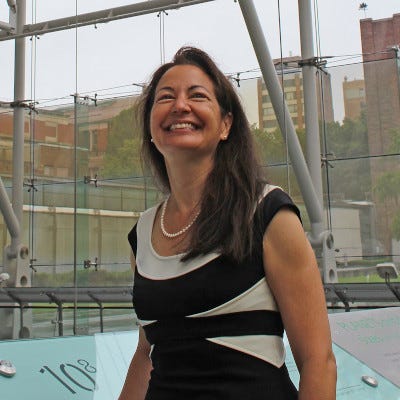
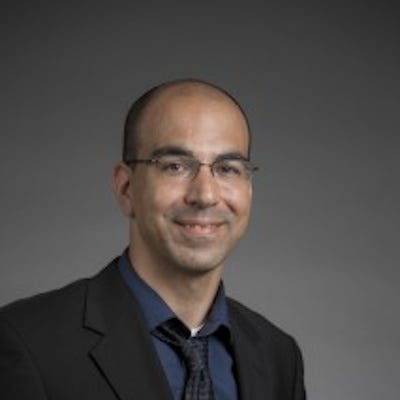
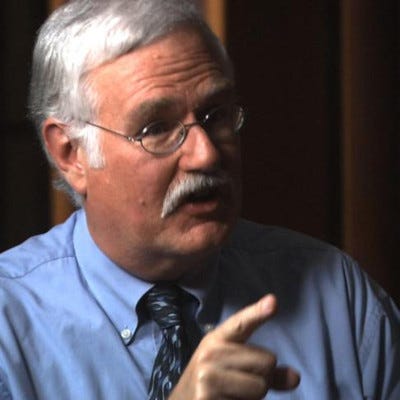
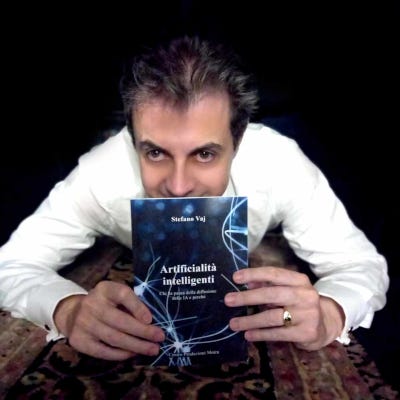
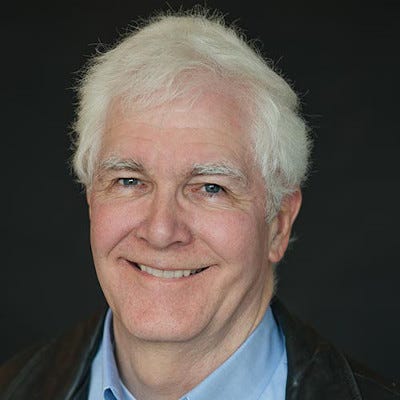

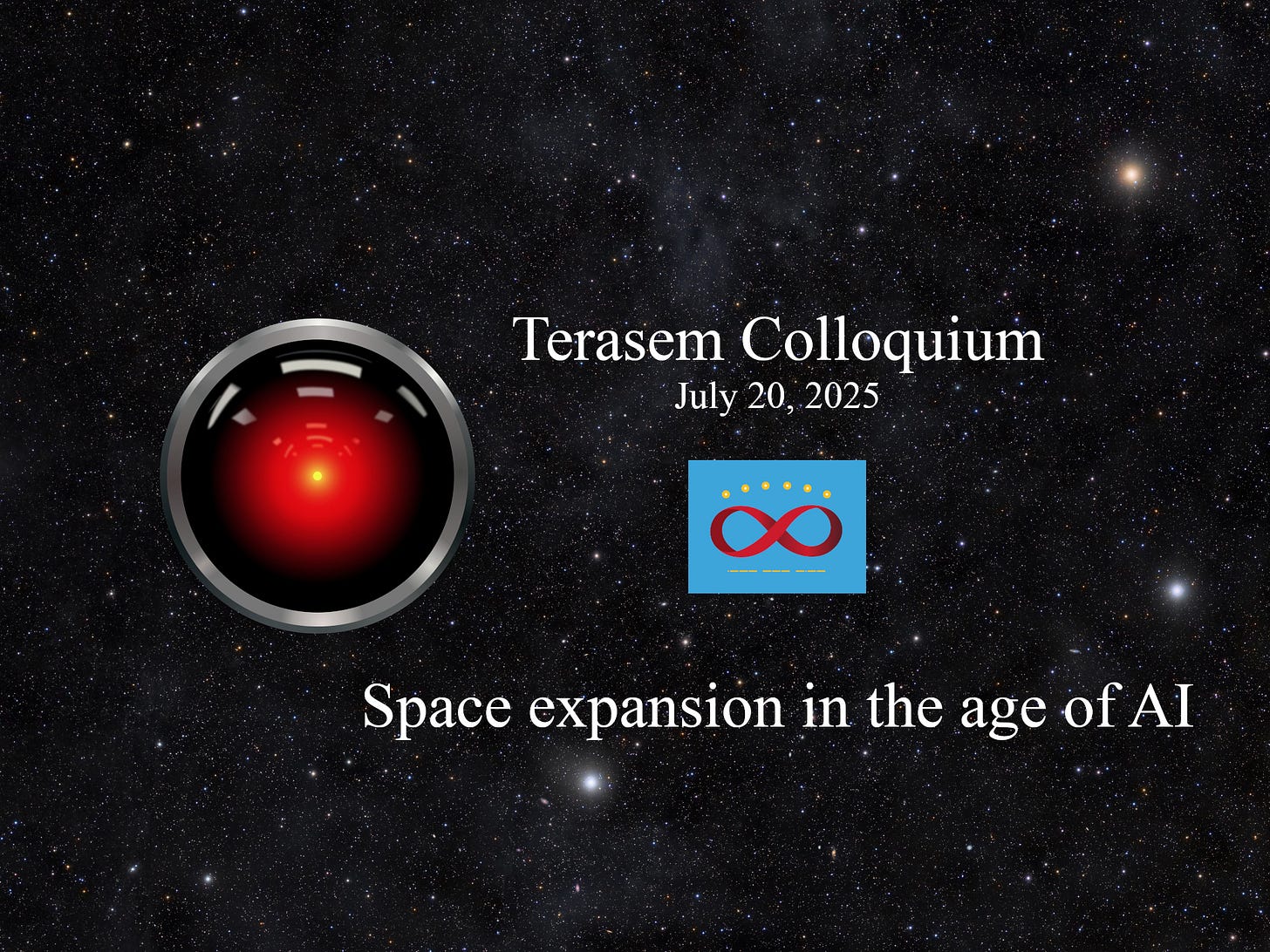
I'm not seeing a link for the Colloquium. It's a bit early for me but I'd like to listen in for at least some of it.